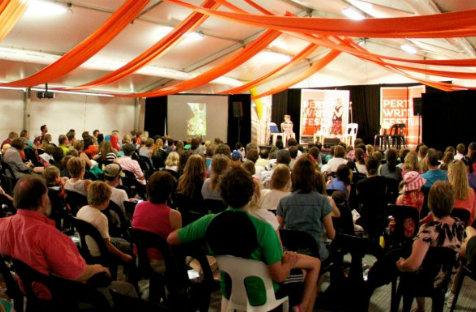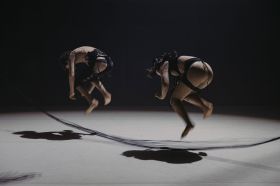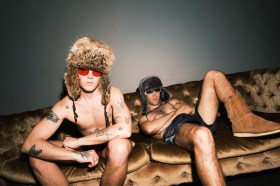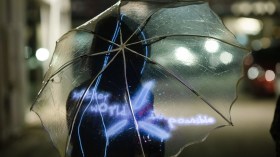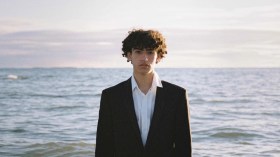Perth-based writer and reviewer Carol Flavell Neist is writing a daily diary detailing her Writers’ Festival highlights, with a special focus on speculative fiction: read her coverage of day one here, and day two here.
Day three, and my first port of call was a session with Michael Leunig, poet, cartoonist and cultural commentator, author of The Adventures of Vasco Pyjama. Leunig was declared an Australian Living Treasure by the National Trust of Australia in 1999. After half an hour in his company I can see why.
He declares that his working class background on the edge of town (factories on one side, paddocks on the other) was ideal for an artist because there was no expectation of conformity to standards in regard to his scribblings. As a boy, he also enjoyed making things from junk found at the rubbish tip, and was once seriously burnt by a tip fire. This rendered him unable to walk for six months. I can imagine that he did a lot of drawing in that time!
As well as satirising politics and social issues, Leunig draws whimsical things from his personal fantasy world. He comments on the fact that when he is stuck in his work or under pressure with a deadline, ‘a duck always turns up’. He eventually discovered that in German mythology, the duck is an archetypal symbol of salvation. There are, indeed, a lot of ducks in Leunig’s cartoons.
Leunig showed himself to be gentle and wise. He has spent four decades being aware of his thought processes, constantly asking himself, ‘What is this?’ He has been creating his funny little pictures since childhood. ‘Children’s art is mysterious,’ he says. ‘I try to bring that quality to my work even today. I think adults are perfectly capable of enjoying the incomprehensible … sometimes, a cartoonist’s job is simply to tell a simple truth.’
As I cannot be in two places at once, I was obliged to desert Leunig in order to hear fantasy writer Isobelle Carmody speak to an audience of children. The huge tent was packed. Although the session was advertised as suited to the 10-14 age group, there were plenty of younger children and a great many adults present as well.
Carmody explained how she came to be a story-teller. Like Leunig, she had a working class childhood, with a widowed mother who had to work nights to support the family – and it fell to the young Isobelle to look after her seven younger siblings. She demonstrated the process whereby, through telling horror stories and acting them out, she kept her brothers and sisters in line!
Perhaps it is also the tribulations of her adolescence that gave Carmody the very obvious social conscience – her popular Obernewtyn series asks why some people perform brave and beautiful acts while others perform dreadful deeds.
‘These things are important to children,’ she says. ‘I get many, many letters – the longest so far was 80 pages! – from children, telling me about some injustice that troubles them’. Her Little Fur series for younger children grew out of her method of teaching her daughter by means of glove puppets. She introduced us to one of them (Crow, of Fox and Crow fame) and played out a little argument with him.
Then it was off to my last hit of China Miéville. This time he was in conversation with award-winning Australian spec-fic author James Bradley (Wrack, The Deep Field, The Resurectionist). Bradley asked Miéville about his newest release, Railsea, and the author described it as being ‘a Mad Max take on Moby Dick. It references many other stories, too, including Treasure Island and Kidnapped. I wrote it for my 12-year old self!’
‘The unwritten novel,’ says Miéville, ‘has a basilisk stare!’ Further discussion led him to admit that he liked to have music to inspire his writing. He chooses a variety of music depending on the work in progress, but he admits to having a fondness for Benjamin Britten. However, a recent favourite is the Burial EP Truant.
Kate Grenville was the next speaker. There is renewed interest in her novel The Secret River, as it has been made into a play. Asked how she came to write the book, Grenville explained that after the 2007 Reconciliation Walk ended at the Sydney Harbour Bridge, she shared an intimate smile with an Aboriginal woman. Suddenly, it struck her that this woman’s ancestors must have been in the area when her own convict ancestor landed in 1806. Her next thought was that her ancestor, along with other settlers, had taken the land from the Aboriginal inhabitants, and thus the idea for The Secret River was born. Her enthusiasm did not stop there – on a visit to London, Grenville sought out and read her ancestor’s record at the Old Bailey. Now it seems likely that the play will soon be converted into a film – and all this because of a shared moment with a stranger!
From Grenville to a musical interlude, in which Stephen Scourfield, Travel Editor of The West Australian, and Will Yeoman, Books Editor of the same paper, gave us a lovely performance with Yeoman on guitar accompanying Scourfield’s readings from his book As the River Runs. It was a lovely, calming interlude before dinner at the University Club.
The end of the day brought the closing speech by Anna Funder. She began by quoting an earlier guest, Michael Leunig: ‘We are born, we live, and sadly, we must write!’ She went on to laugh about her upbringing in a household of parents who were professional scientists: the kind who required appropriate references and comparative studies before even starting a discussion. Her mother used the three children as subjects of study for her higher degree in Child Psychology!
However, they were as fallible as any other parents when it came to child-rearing. Funder gave us a tale of woe concerning needing to go to the toilet while camping in the USA’s Yosemite National Park. The story also contained a bear, a park ranger and not knowing left from right, and it had us all in stitches. She went on to make us cry and laugh by turns, touching on social networking, the craft of writing and the reception of her book Stasiland in the former East Germany. She is a brilliant speaker and an excellent choice for the final address of what was a wonderful Writers Week. Roll on next year!
Perth Writers’ Festival
21 – 23 February
Perth Festival 2013
www.perthfestival.com.au
8 February – 2 March

